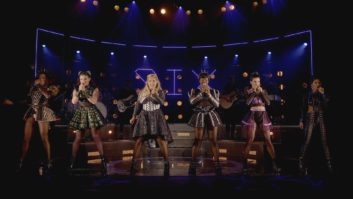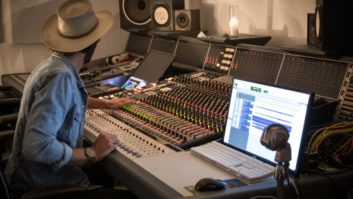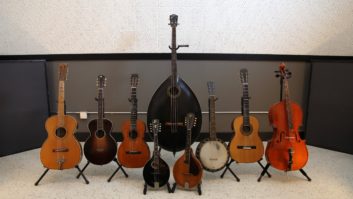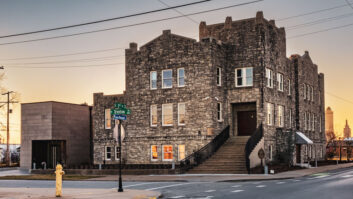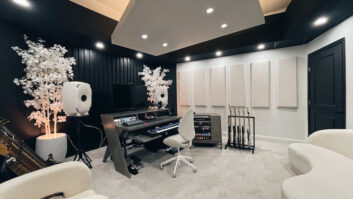LAS VEGAS, NV—Behind 11th Street Records, a vinyl store at the corner of 11th and Fremont streets in downtown Las Vegas, sits National Southwestern Recording—a self-professed “rock and roll recording studio,” featuring classic and proven gear alongside the modern conveniences bands have come to expect from a commercial studio. Its story is one of urban revitalization and the unique powers wielded by scene musicians.
National Southwestern is somewhat of a gift for the musicians that called downtown Vegas home over the years. “Before the ‘big money’ became interested in this part of town, apart from the local characters, this was considered skid row, really,” tells Ronald Corso, owner of both 11th Street Records and National Southwestern, a musician and home studio owner who has been embedded in the scene for years. “There was—and still is—a fair amount of street crime, drugs, gang activity and that kind of stuff. But the only people that were down here doing anything 10 years ago were bands and the people coming down to see them. This was the center of the local music scene when [downtown] revitalization started rolling. So it was a natural fit for what I wanted to do.”
“I had started the process of opening a record store,” Corso continues. “There was a developer who had a goal of ‘downtown revival’ who basically asked me if I wanted to build a studio in a particular part of town. Opening that kind of studio downtown is more than just a venture; it’s a liability. But the more I thought about it, putting a recording studio in the same place as the record store made a lot of sense. Between artists that were record collectors and the opportunity for scene cultivation in Las Vegas—for example, doing in-store appearances for bands—I began to think it could work.”
Over the years, Corso acquired a reasonable amount of his own recording gear, having built out his own home studio—a three-car garage and addition. Yet he knew that for National Southwestern Recording to work, the environment had to be special. “The only way that this was going to make any sense at all was to offer things that [musicians] just aren’t able to get in their bedrooms and garages. So, the idea of a sizeable live room was key; we don’t have iso booths, we have go-bos. It’s a very open space. The [role of the] studio has downsized considerably in the last 20 years, so large performance spaces is mostly left to the high-dollar studios on the coasts and in Nashville. So what I thought about first was the room.”
Ronald Corso on National Southwestern Recording’s space: “It was all built to a price point, but I’ve had studio designers come over and guess what we spent on the studio. It’s always twice to sometimes three times more than we did.”

On considering gear, Corse notes, “We are like a toolbox. We have one to three of everything. Those particular pieces are carefully chosen. But we don’t have, like, five hammers and 25 wrenches. We have analog tape, good outboard gear, and the Trident 80B analog console with 30 board pres and English EQ that I use a lot. If somebody comes in and needs API, I have a couple of 512s in the lunchbox.”
“But of all the iconic English consoles, that’s the most affordable one,” continues Corso on his choice of the Trident 80B. “The next step up is a really big step—and I’ve always liked [the 80B]. A large majority of what we’re doing here is guitar rock, so an 80B is a great guitar rock board. I chose things very carefully.”
Wanting to offer analog tape recording, Corso sought out Nashville’s Mara Machines. “I wanted to have analog tape, but reducing the fuss was important, too,” explains Corso on his Chris Mara-rebuilt two-inch 16-track and half-inch two-track MCI analog tape recorders. “Chris has a great reputation, and having something reconditioned to 100 percent and warrantied, that was pretty amazing.”
Underlining National Southwestern’s location in downtown Las Vegas, Corso is careful to note why it’s cool to work there, depending on the artist’s wants and needs. “It’s an open environment in several ways,” he offers. “If you walk out of the studio, you’re walking into the record store. We’ve had some high-profile clients here who were, at first, a little concerned about being bothered by fans. That never happened, though they did ask that we didn’t tweet that they were here until after they left (laughs). So the studio isn’t isolated, and that’s a plus for some people. You walk out of the studio and are in an energetic scene with lots of cool bars and restaurants. Maybe it’s an unusual place to put a studio, especially when you consider so many studios are tucked away in a warehouse complex somewhere on the edge of town with heavy security and privacy. If that’s what you want, it’s valid. But if you want an open ‘let’s go get a beer and tacos down the street and get back to work’ feel, that’s what we have.”
National Southwestern Recording
http://nationalsouthwestern.com/
